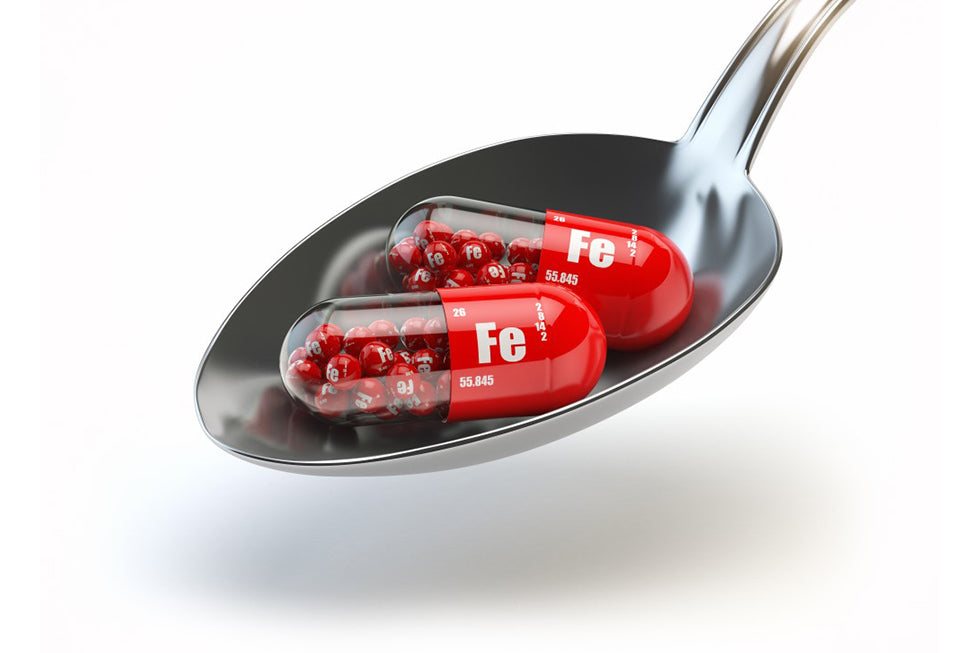
Types of Iron Supplements and Tips for an Iron-Rich Diet
Share
Iron is a vital nutrient responsible for carrying oxygen throughout the body, supporting energy levels, and aiding in cognitive function. When dietary intake isn't enough or iron levels become deficient, iron supplements can help restore balance. This article explores various types of iron supplements, who should take them, recommended dosages for different conditions, and tips for maintaining an iron-rich diet.
Who Should Take Iron Supplements?
Iron supplements aren’t for everyone. They are typically recommended for people with specific conditions that cause or result from low iron levels. Here's who might benefit:
-
People with Iron-Deficiency Anemia
- Signs: Fatigue, pale skin, shortness of breath, dizziness, and cold hands/feet.
- Reason: Anemia occurs when your body doesn’t have enough healthy red blood cells due to insufficient iron.
- Dosage: The typical dose is 150-200 mg of elemental iron per day, divided into two or three doses. A healthcare provider may adjust the dose based on the severity of the anemia.
-
Pregnant Women
- Reason: During pregnancy, blood volume increases, and iron needs rise significantly to support fetal growth.
- Dosage: Pregnant women are often advised to take 27 mg of iron daily (as recommended by the World Health Organization). Those diagnosed with iron-deficiency anemia during pregnancy may require higher doses, as prescribed by their healthcare provider.
-
Women with Heavy Menstrual Bleeding
- Reason: Significant monthly blood loss can deplete iron stores over time.
- Dosage: 60-120 mg of elemental iron daily is often recommended for women experiencing heavy periods, but this should be determined by a healthcare provider after evaluating iron levels.
-
Vegetarians and Vegans
- Reason: Plant-based diets typically contain non-heme iron, which is less efficiently absorbed by the body than heme iron from animal products.
- Dosage: The recommended daily allowance (RDA) for vegetarians and vegans is 1.8 times higher than for non-vegetarians due to lower absorption rates. This means about 14-32 mg of iron daily, depending on age and gender.
-
Infants and Children
- Reason: Rapid growth phases require more iron, and breastfed infants may not get enough iron after the first six months.
-
Dosage: The dosage depends on age:
- Infants (0-6 months): 0.27 mg/day (adequate intake from breast milk/formula).
- Infants (7-12 months): 11 mg/day.
- Children (1-3 years): 7 mg/day.
- Children (4-8 years): 10 mg/day.
- Consult a pediatrician before giving iron supplements to children.
-
Athletes
- Reason: Intense exercise, particularly in endurance sports, can lead to iron loss through sweat and increased red blood cell turnover.
- Dosage: While specific recommendations vary, athletes are often advised to consume 18 mg of iron daily. Those diagnosed with iron deficiency may require supplementation under medical supervision.
-
People with Chronic Diseases
- Examples: Chronic kidney disease (CKD), inflammatory bowel disease (IBD), and heart failure.
- Reason: These conditions can cause chronic inflammation or blood loss, leading to iron deficiency.
- Dosage: Intravenous iron supplementation is often preferred for people with CKD or IBD, as oral iron may not be well-absorbed.
Recommended Dosages for Different Conditions
| Condition | Recommended Daily Dose |
|---|---|
| Mild Iron-Deficiency Anemia | 150-200 mg of elemental iron (divided) |
| Pregnancy | 27 mg (routine); 60-120 mg if deficient |
| Heavy Menstrual Bleeding | 60-120 mg of elemental iron |
| Vegetarian/Vegan Diet | 14-32 mg (1.8x RDA) |
| Infants (7-12 months) | 11 mg |
| Children (1-8 years) | 7-10 mg |
| Athletes | 18 mg (routine); higher if deficient |
| Chronic Kidney Disease or IBD | Determined by healthcare provider |
How to Take Iron Supplements for Best Absorption
- Timing: Iron is best absorbed on an empty stomach. However, if it causes stomach upset, taking it with a small meal can help.
- Avoid Certain Foods: Calcium, caffeine, and high-fiber foods can interfere with iron absorption. Take iron supplements at least two hours apart from these.
- Pair with Vitamin C: Vitamin C enhances iron absorption. A glass of orange juice or a supplement with vitamin C can improve efficacy.
- Consistency Matters: Iron supplementation works gradually. It may take several weeks to notice improvements in symptoms, and full replenishment of iron stores can take months.
Tips for an Iron-Rich Diet
While supplements are useful for treating deficiencies, dietary sources of iron should not be overlooked. Incorporating iron-rich foods into your daily meals can prevent deficiencies and reduce reliance on supplements.
-
Heme Iron Sources (Better Absorbed)
- Red meat (beef, lamb, pork)
- Poultry (chicken, turkey)
- Fish and shellfish (salmon, tuna, clams)
-
Non-Heme Iron Sources
- Legumes (lentils, chickpeas, beans)
- Dark leafy greens (spinach, kale, Swiss chard)
- Tofu, tempeh, and fortified cereals
-
Enhancers of Iron Absorption
- Citrus fruits (oranges, lemons, grapefruits)
- Bell peppers, tomatoes, and broccoli
-
Inhibitors of Iron Absorption
- Tea and coffee (contain polyphenols)
- Dairy products (calcium competes with iron)
- Whole grains and legumes (contain phytates, though soaking and sprouting can reduce these)
Iron is a key player in maintaining overall health, especially for women, children, and those with specific medical conditions. Whether you need a boost from supplements or prefer to focus on dietary sources, ensuring proper iron intake can prevent fatigue, improve physical performance, and promote well-being. Always consult with a healthcare provider before starting any new supplement regimen, especially if you suspect you have an iron deficiency or underlying condition.
